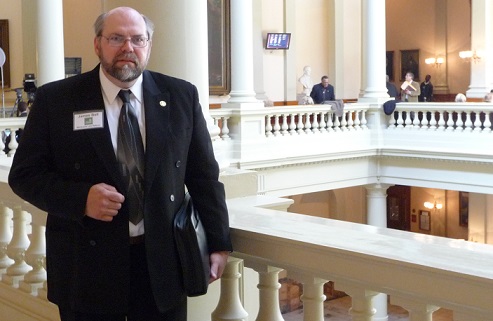Despite federal laws that make growing or possessing marijuana illegal, about a third of states allow its use under limited circumstances.
Thursday, several marijuana reform groups spent the day at the capitol asking Georgia lawmakers to consider joining those states.
For James Bell, the hardest part of doing that is getting lawmakers to listen. 
But he’s trying.
Bell is Director of the Georgia Campaign for Access, Reform and Education—Georgia “CARE.”
As he walks the halls of the Gold Dome, he carries a list of legislators he believes could spearhead the legalization issue in Georgia.
Some are Republicans; some are Democrats.
And, Bell admits, all are hesitant to take the initial step.
“We have talked to two lawmakers who promised a bill for a study committee would be filed this session,” he says. “So far, the bill has not been filed. We know this is a tough issue for everyone to look at.”
Bell says now is a logical time to further that conversation.
Recently, both Washington State and Colorado changed their marijuana laws, making it legal to both possess and use marijuana for recreational purposes.
That’s an eventual goal of Georgia CARE, but its immediate sight is set on legalizing medical marijuana.
And it’s a concept the state addressed more than three decades ago.
“In 1980, the Georgia General Assembly unanimously passed a medical marijuana act in this state,” Bell says. “It allowed doctors to prescribe marijuana for glaucoma and cancer therapy.”
The law remains on the books, but for a host of reasons, it’s not active. Bell says changing that would be logical fix.
Sue Rusche isn’t so sure. She heads National Families in Action, which was founded in Atlanta in 1977. Its main mission is to protect children from substance abuse.
Rusche says she’s not against the medical benefits of marijuana. She is concerned about the delivery method.
“With that joint, and with that smoke, come a whole lot of potential problems and real problems,” she says.
Rusche says cannabis has about 60 chemicals that are believed to be medicinally beneficial. But smoke a joint, and you take in more than 500 chemicals.
Even so, Rusche says there’s little doubt we’ll see more states legalize marijuana. She just wants the conversation to be a well-informed one.
James Bell of Georgia CARE agrees.
“This is not a taboo issue; we can talk about this,” Bell says.


9(MDAxODM0MDY4MDEyMTY4NDA3MzI3YjkzMw004))






